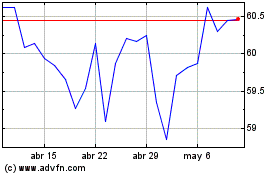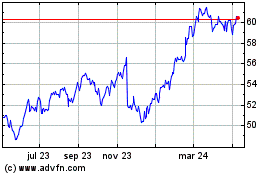U.S. Companies Balk at Amazon's Call for Covid-19 Disclosures
06 Octubre 2020 - 10:46AM
Noticias Dow Jones
By Sarah Krouse
Amazon.com Inc. last week called on other large companies to
share the results of their workplace Covid-19 testing and disclose
the rate at which employees are quarantining. So far, their answer
appears to be no.
U.S. companies are in the midst of an unprecedented effort to
prevent and quickly contain outbreaks as they bring more staff back
to factories, restaurants, offices and entertainment studios.
Companies including Walmart Inc., Ford Motor Co., Kroger Co. and
Smithfield Foods Inc. have provided Covid-19 diagnostic testing to
workers with varying degrees of regularity. Some employees are
tested daily and others every week. Some firms ship swabs to the
homes of employees who fear they have been infected, while others
host on-site testing.
Many companies are loath to share their results publicly beyond
what they must relay to public health agencies because they aren't
required to. Some find publishing the information burdensome and
don't want to open themselves up to criticism if trends take a turn
for the worse, testing advisers say.
Regularly disclosing the results of workplace Covid-19 testing
"demonstrates that you have a plan and that you're investing in
that plan," said Justin Bellante, founder and president of testing
company BioIQ. Still, it could become a liability, he said.
"Any information you don't have to disclose as a company you
don't want used against you, good or bad," Mr. Bellante added.
Amazon last week said more than 19,000 of its workers had tested
positive for Covid-19, fewer than it expected and below the case
rate in most states. It has faced criticism for being slow to
communicate worker infections early on in the pandemic.
"Wide availability of data would allow us to benchmark our
progress and share best practices across businesses and
industries," the company wrote in a blog post, adding that there
are no common reporting or data-sharing standards. It regularly
screens workers regardless of whether or not they have
symptoms.
Walmart, the country's largest retailer, doesn't have its own
end-to-end testing apparatus, doesn't test asymptomatic workers and
doesn't share Covid-19 infection data for its roughly 1.5 million
U.S. workers, a spokesman said.
"We believe Walmart associates' rate of infection tracks, or is
below, the current rate of infection nationwide," the spokesman
said. The Wall Street Journal reported in April that at the time
fewer than 2,000 Walmart workers had tested positive for
Covid-19.
FedEx Corp. has set up drive-through Covid-19 testing sites that
are free for its employees, and in September told shareholders that
its infection rate was about 1.7% of its workforce. A spokeswoman
said the company had nothing additional to share.
A Ford spokeswoman said the company had set up testing sites for
symptomatic workers in several areas but had no plan to share
further information.
UnitedHealth Group Inc., which mails at-home test kits to nurses
who make house calls, but doesn't broadly test its workers, said it
wouldn't be meaningful or relevant to share total case counts.
It is easier for corporations to keep their testing strategies
and results private than it is for sports teams, testing and
medical advisers say, because an infected player means tweaking a
roster and an outbreak could lead to a canceled game. Schools, too,
are often more inclined to regularly disclose data to concerned
parents and students.
Many companies have so far been slow to publicize even the
details of their testing strategies, let alone the results, in part
because they are continually changing, said Sean Murray, president
of the Covid-19 workplace testing program at lab-services company
Eurofins.
"It's not a straightforward thing," he said, adding that there
are philosophical debates over periodically testing workers with
super-accurate tests or regularly testing them with rapid tests
that may deliver false negatives.
--Sarah Nassauer contributed to this article.
Write to Sarah Krouse at sarah.krouse@wsj.com
(END) Dow Jones Newswires
October 06, 2020 11:31 ET (15:31 GMT)
Copyright (c) 2020 Dow Jones & Company, Inc.
Walmart (NYSE:WMT)
Gráfica de Acción Histórica
De Mar 2024 a Abr 2024

Walmart (NYSE:WMT)
Gráfica de Acción Histórica
De Abr 2023 a Abr 2024
